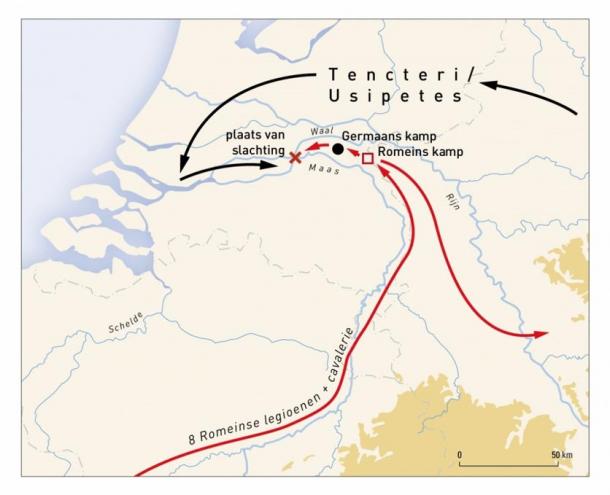An Earlier Exceptional Nation
A cache of bones and artifacts buried at a site near to where the Waal and Meuse rivers meet testify to a genocidal slaughter of tragic proportions. As recorded by Julius Caesar himself, a bloody battle took place in 55 BC resulting in the genocide of between 150,000 and 200,000 Germanic tribespeople, including women and children, in what is now Netherlands.
Archaeologists from Vrije Universiteit Amsterdam , working with three decades’ worth of archaeological finds as well as historical and geochemical data, have formed conclusions about the dark events that took place thousands of years ago between Julius Caesar and two Germanic tribes, the Tencteri and Usipetes, reports PastHorizons. These finds place Julius Caesar on Dutch soil for the first time in historical record.
A People Betrayed and Destroyed
In Book IV of his De Bello Gallico, Roman Dictator Julius Caesar chronicled in detail the events leading to the mass killings, said to be the earliest known battle on Dutch soil.
The two Germanic tribes, arriving from the east of the Rhine in the spring of the year, had appealed to the Caesar for asylum, after having been driven from their lands by another tribe, the Suebi. The Roman leader refused their request, but instead suggested they share land with another tribe who were also enemies with the Suebi.

Map of the site, and red indicating the movements and encampments of the Romans and tribes. Credit: VU University Amsterdam
The Tencteri and Usipetes are said to have petitioned for a three-day truce to consider the offer, but Julius Caesar abruptly ordered his men to destroy the tribes “violently,” reveals IBTimes.
In what is described as Caesar at his “absolute worst,” he sent his eight legions and cavalry to pursue the fleeing tribes. The legions surrounded them and cut them all down—men, women, and children.
The post An Earlier Exceptional Nation appeared first on LewRockwell.
Leave a Reply